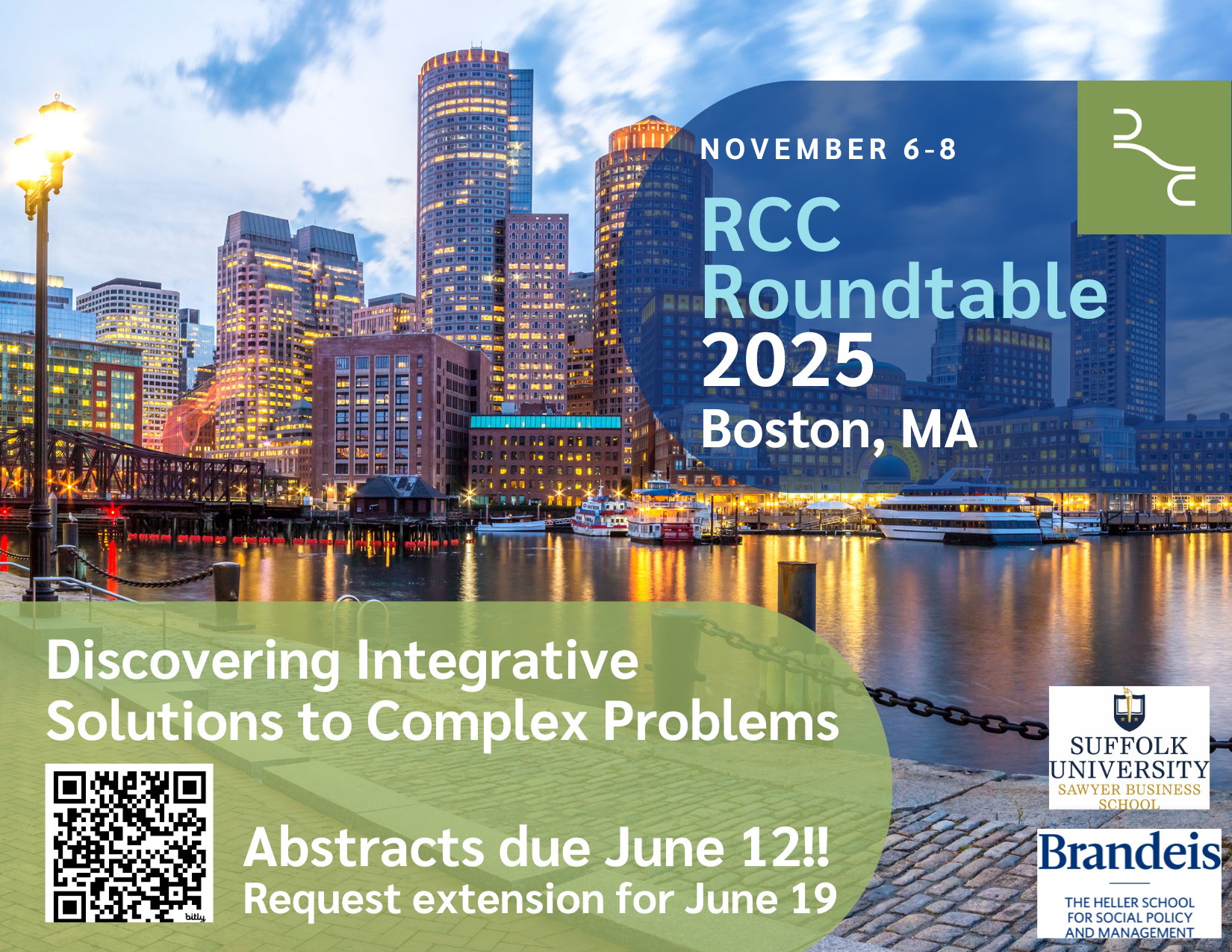Key Dates in the Process
- June 20 - Submission Deadline (email relationalcoord@brandeis.edu for additional time)
- July 18 - Notification of Acceptance
- August 1 - Registration Deadline for Presenters
- August 15 - Program Goes Live!
- November 6-8 - RCC Roundtable 2025 at Suffolk University
If you have any questions or wish to receive feedback on your idea before submitting, please feel free to contact the RCC Team at relationalcoord@brandeis.edu.
Submission Information
Abstract Specifications
- Word limit: 500 words per abstract (not including the title and author[s])
- Content: Your abstract should provide 1) a concise summary of your project, 2) the context, 3) your methods, 4) your key findings or learnings (or expected findings or learnings) and 5) implications for action.
- For workshop proposals, the abstract should include 1) a concise summary of the workshop, 2) your learning objectives, and 3) a description of the interactive elements you plan to incorporate.
submit group proposals with 3 to 4 abstracts on a common theme
submit workshop proposals with interactive elements for hands-on learning
Presentation Formats
For each accepted proposal, presenter(s) will be notified of the designated presentation format:
- Individual presentations grouped together into a session: Four 15-minute oral presentations grouped together either in your proposal or by the Roundtable organizers, followed by interactive group discussion
- Shift & Share: 5-minute oral presentation followed by 15-minute small group discussion, repeated 4 times
- Workshop: 1.5 hour hands-on interactive session
Topics to Consider
See Roundtable 2025 Theme here
- The Relational Model of Change. Many organizations are engaged in interventions using the Relational Model of Change and the evidence is growing. What are we learning? How do relational, structural and work process interventions help to build RC into daily work? What does the change journey look like, what are the challenges, and what are the outcomes?
- Cross Sector Coordination and Boundary Spanner Roles. Many of the challenges we face cannot be solved by one organization or sector. How are organizations engaging in cross-sector coordination to solve wicked problems? How do boundary spanner individuals, teams or organizations help make this happen? Check out this work by Mads Peter Klindt on Boundary Spanning and Partnership Performance.
- Healthcare Networks. How do we strengthen networks within and across healthcare systems, community organizations, and public health to deliver high value care with attention to the needs of patients and the healthcare workforce?
- Technology, AI and Workplace Relationships. AI and other technologies are rapidly transforming the workplace and how we coordinate our work . How can we build RC into the human/AI relationship, and use AI and other forms of IT to facilitate RC among the work groups who need to better coordinate their work? Check out this paper by Marthe Berntzen at University of Oslo for inspiration - A Relational Coordination Theory Perspective on Communication Tools in the Digital Workplace - hot off the press. Feel free to visit (and join) the Digital Ecosystems Innovation Lab here - they will be presenting their current work at the Roundtable!
- Relational Human Resource Management. Every day our organizations select, train, reward, manage performance and resolve conflicts - but many of our HR structures are non-relational. How can organizations develop HR practices that build relational coordination internally and with their partner organizations? See here for a recent publication by Qian Zhang and co-authors called Managing Interprofessional Teamwork: Strategic Relational Human Resource Management and the Power of Relational Coordination.
- Relating Across Difference. Many organizations are striving to strengthen relationships among people with diverse professional and social identities. How does a relational approach to diversity work? Check out this paper about Fumbling in Relationships Across Difference by Sandra Cha, Stephanie Creary and Laura Roberts for inspiration - and visit the Relating Across Difference Innovation Lab here.
- Seeing the Whole Together Through Measurement and Visualization. RC is a social network measure of communicating and relating for the purpose of task integration. There is a huge opportunity to bring relational coordination, social networks and other data visualization methods together to help stakeholders see the whole together and make desired changes. Check out this recent study on Seeing the Whole Together Through Relational Mapping: A Method for Engaging in Complex Systems Change by Lauren Hajjar, John Paul Stephens, Ninna Meier and Joel Cutcher-Gershenfeld!
- Relational Society and Resilient Communities. How can we build inclusive, equitable, vibrant and resilient communities, at home and at work? Doing so may require us to make changes at the interpersonal, organizational and institutional levels. Bring your experiences about how relational society happens in your part of the world - and come to the Roundtable to learn more about the International Network for Relational Development.
- Strengthening Higher Education. How can education leaders strengthen relational coordination among faculty, students, administrators, staff, families, communities, alums, donors, public sector funders, board members and other key stakeholders for more inclusive outcomes in educational systems? Visit the Higher Education Innovation Lab here for ideas, and consider joining!
Registration
To be included on the program, all presenters must register for the Roundtable. The RCC is seeking to expand opportunities to participate in the Roundtable, so feel free to write to the RCC at relationalcoord@brandeis.edu to inquire about scholarships. For those who are able, feel free to contribute to the scholarship fund when you register.

